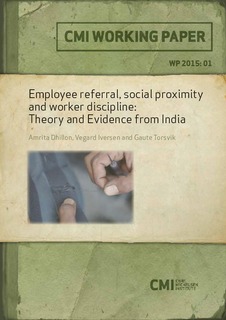| dc.contributor.author | Dhillon, Amrita | |
| dc.contributor.author | Iversen, Vegard | |
| dc.contributor.author | Torsvik, Gaute | |
| dc.date.accessioned | 2018-01-04T08:20:51Z | |
| dc.date.available | 2018-01-04T08:20:51Z | |
| dc.date.issued | 2015-02-01 | |
| dc.identifier | oai:www.cmi.no:5386 | |
| dc.identifier.citation | Bergen: Chr. Michelsen Institute (CMI Working Paper WP 2015:1) 39 p. | |
| dc.identifier.isbn | 82-8062- | |
| dc.identifier.issn | 0804-3639 | |
| dc.identifier.uri | http://hdl.handle.net/11250/2475147 | |
| dc.description.abstract | We develop a new theory of employee referrals into informal low - and unskilled jobs in developing country labour markets. Employers use social preferences between referees and new recruits to mitigate moral hazard problems in the workplace. We show that employers prefer to hire workers with strong social ties to referees and deliberately select referees with high stakes in the firm. In-depth primary data on low- and unskilled migrants in India are used to provide a suggestive empirical counterpart to these results. Consistent with the theoretical predictions, we observe a high prevalence of referral and of strong social ties between referees and new recruits. Further, workplace intermediaries are different from and typically in higher stake and more ‘prestigious’ jobs than those recruited. Detailed evidence on wages and job types from the main sector of migrant employment provides additional support for our moral hazard explanation for referral. | |
| dc.language.iso | eng | |
| dc.publisher | Chr. Michelsen Institute | |
| dc.relation | CMI Working Paper | |
| dc.relation | WP 2015:1 | |
| dc.relation.ispartof | CMI Working Paper | |
| dc.relation.ispartofseries | CMI Working Paper WP 2015:1 | |
| dc.relation.uri | https://www.cmi.no/publications/5386-employee-referral | |
| dc.title | Employee referral, social proximity and worker discipline: Theory and Evidence from India | |
| dc.type | Working paper | |
